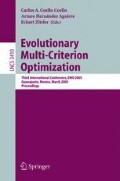Abstract
Deception problems are among the hardest problems to solve using ordinary genetic algorithms. Designed to simulate a high degree of epistasis, these deception problems imitate extremely difficult real world problems. [1]. Studies show that Bayesian optimization and explicit building block manipulation algorithms, like the fast messy genetic algorithm (fmGA), can help in solving these problems. This paper compares the results acquired from an extended multiobjective fast messy genetic algorithm (MOMGA-IIa), ordinary multiobjective fast messy genetic algorithm (MOMGA-II), multiobjective Bayesian optimization algorithm (mBOA), and the non-dominated sorting genetic algorithm-II (NSGA-II) when applied to three different deception problems. The extended MOMGA-II is enhanced with a new technique exploiting the fmGA’s basis function to improve partitioned searching in both the genotype and phenotype domain. The three deceptive problems studied are: interleaved minimal deceptive problem, interleaved 5-bit trap function, and interleaved 6-bit bipolar function. The unmodified MOMGA-II, by design, explicitly learns building block linkages, a requirement if an algorithm is to solve these hard deception problems. Results using the MOMGA-IIa are excellent when compared to the non-explicit building block algorithm results of both the mBOA and NSGA-II.
Access this chapter
Tax calculation will be finalised at checkout
Purchases are for personal use only
Preview
Unable to display preview. Download preview PDF.
References
Reeves, C., Wright, C.: An experimental design perspective on genetic algorithms. In: Darrell Whitley, L., Vose, M.D. (eds.) Foundations of Genetic Algorithms 3, pp. 7–22. Morgan Kaufmann, San Francisco (1995)
Day, R.O.: A multiobjective approach applied to the protein structure prediction problem. Ms thesis, Air Force Institute of Technology, Sponsor: AFRL/Material Directorate (March 2002)
Zydallis, J.B.: Explicit Building-Block Multiobjective Genetic Algorithms: Theory, Analysis, and Development. Dissertation, Air Force Institute of Technology, AFIT/ENG, BLDG 642, 2950 HOBSON WAY, WPAFB (Dayton) OH 45433-7765 (February 2002)
Day, R.O., Kleeman, M.P., Lamont, G.B.: Solving the Multi-objective Quadratic Assignment Problem Using a fast messy Genetic Algorithm. In: Congress on Evolutionary Computation (CEC’2003), December 2003, pp. 2277–2283. IEEE Service Center, Piscataway (2003)
Kleeman, M.P.: Optimization of heterogeneous uav communications using the multiobjective quadratic assignment problem. Ms thesis, Air Force Institute of Technology, Sponsor AFRL (March 2004)
Day, R.O., Lamont, G.B.: Multi-objective fast messy genetic algorithm solving deception problems. In: Congress on Evolutionary Computation, Portland, Oregon, June 19 - 23, vol. 4, pp. 1502–1509 (2004)
Coello Coello, C.A., Van Veldhuizen, D.A., Lamont, G.B.: Evolutionary Algorithms for Solving Multi-Objective Problems. Kluwer Academic Publishers, New York (2002)
Fonseca, C.M., Fleming, P.J.: Genetic Algorithms for Multiobjective Optimization: Formulation, Discussion and Generalization. In: Forrest, S. (ed.) Proceedings of the Fifth International Conference on Genetic Algorithms. University of Illinois at Urbana-Champaign, pp. 416–423. Morgan Kauffman Publishers, San Mateo (1993)
Pelikan, M.: Bayesian Optimization Algorithm: From Single Level to Hierarchy. Thesis, University of Illinois at Urbana-Champaign, 117 Transportation Building, 104 S. Mathews Avenue Urbana, IL 61801, IlliGAL Report No. 2002023 (July 2002)
Khan, N., Goldberg, D.E., Pelikan, M.: Multi-objective byesian optimization algorithm. ILLiGAL Report 2002009, University of Illinois at Urbana-Champaign, 117 Transportation Building, 104 S. Mathews Avenue Urbana, IL 61801 (March 2002)
Goldberg, D.E., Deb, K., Kargupta, H., Harik, G.: Rapid, accurate optimization of difficult problems using fast messy genetic algorithms. In: Proceedings of the Fifth International Conference on Genetic Algorithms, July 1993, pp. 56–64 (1993)
Khan, N.: Bayesian optimization algorithms for multiobjective and heierarchically difficult problems. Master thesis, University of Illinois at Urbana-Champaign, 117 Transportation Building (July 2003)
Goldberg, D.: Genetic Algorithms and Simulated Annealing. In: Simple Genetic Algofithms and the Minimal, Decptive Problem, pp. 74–88. Morgan Kaufmann, Pubs., San Francisco (1987)
Darrell Whitley, L.: Fundamental principles of deception in genetic search. In: Rawlins, G.J. (ed.) Foundations of genetic algorithms, pp. 221–241. Morgan Kaufmann, San Mateo (1991)
Deb, K., Horn, J., Goldberg, D.E.: Multimodal deceptive functions. Technical Report IlliGAL Report No 92003, University of Illinois, Urbana (1992)
Deb, K., Goldberg, D.E.: Analyzing deception in trap functions. In: Darrell Whitley, L. (ed.) Foundations of Genetic Algorithms 2, pp. 93–108. Morgan Kaufmann, San Mateo (1993)
Goldberg, D.E., Deb, K., Horn, J.: Massive multimodality, deception and genetic algorithms. In: Männer, R., Manderick, B. (eds.) Parallel Problem Solving from Nature 2. Elsevier Science Publishers, Amsterdam (1992)
Zydallis, J.B., Lamont, G.B.: Explicit Building-Block Multiobjective Evolutionary Algorithms for NPC Problems. In: Congress on Evolutionary Computation (CEC 2003), December 2003, vol. 4, pp. 2685–2695. IEEE Service Center, Piscataway (2003)
Author information
Authors and Affiliations
Editor information
Editors and Affiliations
Rights and permissions
Copyright information
© 2005 Springer-Verlag Berlin Heidelberg
About this paper
Cite this paper
Day, R.O., Lamont, G.B. (2005). Extended Multi-objective fast messy Genetic Algorithm Solving Deception Problems. In: Coello Coello, C.A., Hernández Aguirre, A., Zitzler, E. (eds) Evolutionary Multi-Criterion Optimization. EMO 2005. Lecture Notes in Computer Science, vol 3410. Springer, Berlin, Heidelberg. https://doi.org/10.1007/978-3-540-31880-4_21
Download citation
DOI: https://doi.org/10.1007/978-3-540-31880-4_21
Publisher Name: Springer, Berlin, Heidelberg
Print ISBN: 978-3-540-24983-2
Online ISBN: 978-3-540-31880-4
eBook Packages: Computer ScienceComputer Science (R0)

